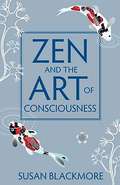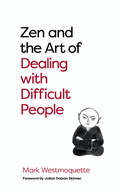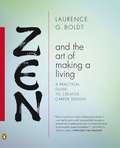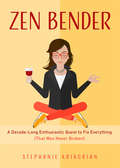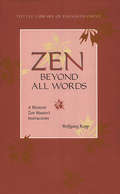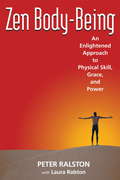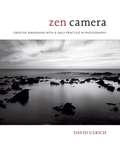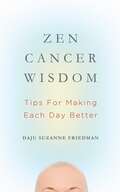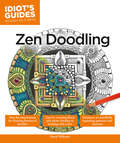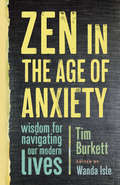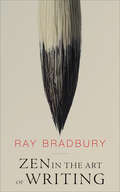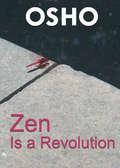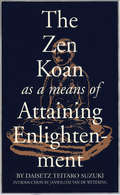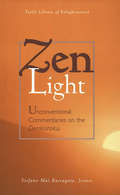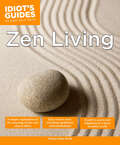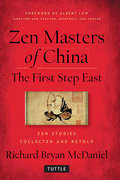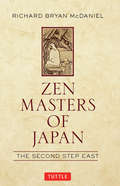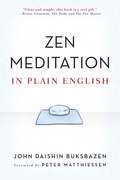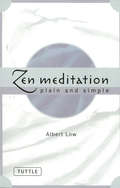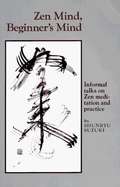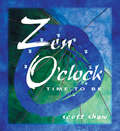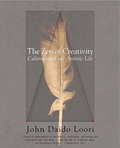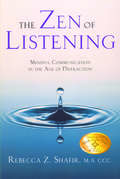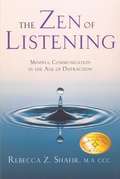- Table View
- List View
Zen and the Art of Consciousness
by Susan BlackmoreWho are you? When are you? What were you conscious of a moment ago? This groundbreaking book sees acclaimed psychologist Susan Blackmore combining the latest scientific theories about mind, self, and consciousness with a lifetime's practice of Zen. Framed by ten critical questions derived from Zen teachings and designed to expand your understanding and experience of consciousness, Ten Zen Questions doesn't offer final - or easy - answers, but instead provides an inspiring exploration of how intellectual enquiry and meditation can tackle some of today's greatest scientific mysteries. Dr Susan Blackmore is a writer and broadcaster. She lives in Bristol, UK.
Zen and the Art of Dealing with Difficult People
by Mark WestmoquetteThis is a unique guide to coping with challenging people using practical Zen and mindfulness tools. It helps readers explore their reactions, break free from knee-jerk response patterns and see if these people may in fact prove to be useful teachers in life – troublesome Buddhas.This is a guide to applying the teachings of mindfulness and Zen to the troublesome or challenging people in our lives. Perhaps you can see there&’s often a pattern to your behaviour in relation to them and that it often causes pain – perhaps a great deal of pain. The only way we can grow is by facing this pain, acknowledging how we feel and how we&’ve reacted, and making an intention or commitment to end this repeating pattern of suffering. In this book, Mark Westmoquette speaks from a place of profound personal experience. A Zen monk, he has endured two life-changing traumas caused by other people: his sexual abuse by his own father; and his stepfather&’s death and mother&’s very serious injury in a car crash due to the careless driving of an off-duty policeman. He stresses that by bringing awareness and kindness to these relationships, our initial stance of &“I can&’t stand this person, they need to change&” will naturally shift into something much broader and more inclusive. The book makes playful use of Zen koans – apparently nonsensical phrases or stories – to help jar us out of habitual ways of perceiving the world and nudge us toward a new perspective of wisdom and compassion.
Zen and the Art of Making a Living: A Practical Guide to Creative Career Design
by Laurence G. BoldtWith today's economic uncertainties, millions of Americans realize they must seize control over their own career paths. They want work that not only pays the bills but also allows them to pursue their real passions. In this revised edition, Laurence Boldt updates and revises his revolutionary guide to meet the challenges of the twenty-first century workplace. The first part of this book helps readers to identify the work that they really want to do, while the second provides practical, active steps to finding or creating that work. Zen and the Art of Making a Living goes beyond inspiration, providing a proven formula for bringing creativity, dignity, and meaning to every aspect of the work experience.
Zen Bender: A Decade-Long Enthusiastic Quest to Fix Everything (That Was Never Broken)
by Stephanie Krikorian&“The book is filled with humor and soul-baring honesty, as Krikorian describes her adventures down just about every self-help road there is.&” —The Independent When the recession turned her life upside down, Stephanie Krikorian had to reinvent her life—and fast. She started ghostwriting self-help books for women. Between writing and researching she realized that everywhere she looked there was AFOG. Another freaking opportunity for growth. Soon she wasn&’t just writing each book; she was living them. This was the start of a ten-year zen bender of dieting, dating, journaling, meditating, and Marie-Kondo-ing on a quest for that ultimate self-help high. Stephanie Krikorian spent her forties trying all of the dating hacks to find love and respect, all of the diets to build self-esteem in a new body, and all of the spiritual guidance to become centered through self-care. On the brink of turning fifty she realized that being better wasn&’t what she craved; it was something else altogether. Zen Bender is the story of one woman&’s journey to radical acceptance, with some questionable advice along the way. A witty, moving, insightful story, the woman behind bestselling celebrity self-help books shares her story of being hooked on the self-help fix for a decade before learning that all the self-help in the world won&’t help you trust gut. &“A wise, witty and thought-provoking book that tends in just the place you&’d hope it would. A great read whether you have a Reiki healer on speed dial, or, well, not.&” —Marianne Power, author of Help Me!: One Woman&’s Quest to Find Out if Self-Help Really Can Change Her Life
Zen Beyond All Words
by Wolfgang Kopp Barbara Wittenberg-HaenauerZen Beyond All Words contains a selection of talks given by MasterWolfgang Kopp at the Tao Ch'an Center in Wiesbaden, Germany, during the summer of 1992. In the spirit of the ancient Chinese Ch'an masters, Wolfgang Kopp teaches a direct and powerful Zen. He conveys neither a theoretical system nor a one-sided dogmatism of sitting, and he neither wears customary robes nor holds a traditional title.
Zen Body-Being: An Enlightened Approach to Physical Skill, Grace, and Power (Zen Buddhism Ser.)
by Peter Ralston Laura RalstonIn this inspiring guide, Peter Ralston presents a program of "physical education" for anyone interested in body improvement. Using simple, clear language to demystify the Zen mindset, he draws on more than three decades of experience teaching students and apprentices worldwide who have applied his body-being approach. More of a transformative guide than a specific list of exercises devoted to any particular physical approach, Zen Body-Being explains how to create a state of mental control, enhanced feeling-awareness, correct structural alignment, increased spatial acuity, and even a greater interactive presence. Exercises are simple, often involving feeling-imagery and meditative awareness, which have a profound and sometimes instant effect. Where similar guides teach readers what to do, this book teaches readers how to be.From the Trade Paperback edition.
Zen Camera: Creative Awakening with a Daily Practice in Photography
by David UlrichZen Camera is an unprecedented photography practice that guides you to the creativity at your fingertips, calling for nothing more than your vision and any camera, even the one embedded in your phone. David Ulrich draws on the principles of Zen practice as well as forty years of teaching photography to offer six profound lessons for developing your self-expression. Doing for photography what The Artist’s Way and Drawing on the Right Side of the Brain did for their respective crafts, Zen Camera encourages you to build a visual journaling practice called your Daily Record in which photography can become a path of self-discovery. Beautifully illustrated with 83 photographs, its insights into the nature of seeing, art, and personal growth allow you to create photographs that are beautiful, meaningful, and uniquely your own.You’ll ultimately learn to change the way you interact with technology—transforming it into a way to uncover your innate power of attention and mindfulness, to see creatively, and to live authentically.
Zen Cancer Wisdom: Tips for Making Each Day Better
by Suzaanne FriedmanWith a much-needed sense of levity, Daju Suzanne Friedman teaches the art of keeping one's body, mind, and spirit together while living with cancer."Layman Wang once asked his attendant,'What would you do if a dragon suddenly arrived here?' His attendant answered, 'I wouldn't pay attention to anything else.' This is how it feels when you've been diagnosed with cancer. Your attention and focus shift dramatically towards just this one thing. While single-minded focus can be beneficial, it is also important to remember that you are more than your diagnosis, and that there is more to life than being a patient." --from the introduction In Zen Cancer Wisdom, Daju Suzanne Friedman--Zen teacher, Chinese medicine doctor, and Qigong specialist--shares the inspirations, insights, and humor that helped her to continue to live fully in the face of cancer. With sections devoted to soothing the spirit, harnessing the mind, nourishing the body, and qigong stretches for soothing aches and pains, Friedman provides thoughtful guidance on topics ranging from hair loss and constipation to coping with stress and learning to laugh again. Each chapter begins with an anecdote drawn from the Zen tradition, followed by personal reflection, and a brief guided practice specifically for cancer patients. Pocket-sized, with short, buoyant chapters, and meditation exercises designed to be practicable anywhere in only a few minutes time, Zen Cancer Wisdom is the perfect companion book for cancer patients.
Zen Doodling (Idiot's Guides)
by David WilliamsDoodling isn't necessarily a mindless pursuit. There's hidden discipline, order, and joy behind artful scribbles. Idiot's Guides: Zen Doodling gives readers beautiful, full-color instruction and all they need to start using ordered, repeated "tangle" designs that are great creative expressions and works of art unto themselves. The book includes step-by-step instructions for drawing more than 20 doodle forms and patterns.
Zen in the Age of Anxiety: Wisdom for Navigating Our Modern Lives
by Tim Burkett Wanda IsleZen wisdom for identifying the causes of mental and emotional anxiety epidemic in today's world and for finding the path to a peaceful heart in the midst of them--a path that leads directly though the center of the anxiety we're trying to escape.Wrestling with fear doesn’t have to be a negative experience. This book offers an approach to life that unlocks a new way of thinking and being in the world, one that leads directly through the center of the anxieties we seek to avoid.Written in the style of an owner’s manual, a guide to being human, Burkett focuses on areas of pain and anxiety as they tend to manifest for modern people: feelings of unworthiness, and issues surrounding sex, money, failure, and even death. Providing wisdom from Zen (channeled through his many experiences as a psychotherapist) and using language and metaphors from popular culture, he takes anxiety and teaches us to turn those fears into the building blocks of a fulfilling life.
Zen in the Art of Writing: Essays On Creativity
by Ray BradburyThe celebrated author of Fahrenheit 451 and The Martian Chronicles offers inspiration and insight on finding one&’s muse and channeling it onto the page. Acclaimed writer of novels and short stories as well as screen- and stage plays, Ray Bradbury has established himself as one of the most legendary voices in science fiction and fantasy. In Zen in the Art of Writing, he shares how his unbridled passion for creating worlds made him a master of the craft. Part memoir, part philosophical guide, the essays in this book teach the joy of writing. Rather than focusing on the mechanics of putting words together, Bradbury&’s zen is found in the celebration of storytelling that drove him to write every day. Bringing together eleven essays and a series of poems written with his own unique style and fervor, Zen in the Art of Writing is a must read for all prospective writers and Bradbury fans. &“Bradbury lovers will find this a Bradbury feast.&” —Kirkus Reviews
Zen Is a Revolution
by Osho Osho International FoundationIn this talk Osho takes his audience into the world of ZEN. "There are a few essential things which make Zen absolutely different from any kind of teaching. The most important of these essentials is that Zen is a revolution. All other religions are servants to the vested interests. The rich people and the powerful people, the politicians, have dominated all the religions. The priests have been nothing but servants to these criminals. It is such a worldwide conspiracy that no one recognizes it. It is so obvious and so simple that we are from the very beginning, from our very childhood, being programmed." From an original series: Rinzai: Master of the Irrational, by Osho.
Zen Koan as a Means of Attaining Enlightenment
by Daisetz Teitaro SuzukiZen Koan as a Means of Attaining Enlightenment Presents the history and application of the koan exercise--the means for realizing enlightenment--with depth and clarity.<P><P>The koan system has effected a special development in Zen Buddhism, and is a unique contribution to the history of religious consciousness. When the importance of the koan is understood, it may be said that more than half of Zen is understood.
Zen Light
by Stefano Mui BarragatoThe Denkoroku, or "Record of Transmitting the Light," contains the enlightenment stories of the earliest Zen ancestors. In Zen Ught, the author comments on this Buddhist classic, which he studied as part of his own advanced Zen training. Sensei Barragato brings the varied experiences of his life and his studies in Catholicism and Quaker practice to the teachings of Zen Buddhism, making these commentaries at once off-beat, refreshing, and revealing. He touches on the major issues that affect our lives, making thisbook of interest to both the beginning as well as the advanced student of Zen.
Zen Living: A Simple Explanation of the Meaning of Zen and What It Offers (Idiot's Guides)
by Domyo Sater BurkIn today's fast-paced, technology-laden society, it's easy to become overwhelmed. People seek calm and simplicity, but have a hard time realizing a "Zen" life. Monk and sensei Domyo Sater Burk illustrates how to get started on the path to peace and enlightenment, regardless of cultural or religious affiliation. You'll learn the foundation and essential teachings of Zen practice, how to engage in meditation and mindfulness, and how to live daily within a Zen moral code.
Zen Masters of China
by Albert Low Richard Bryan Mcdaniel[Zen Masters of China presents more than 300 traditional Zen stories and koans, far more than any other collection. Retelling them in their proper place in Zen's historical journey, it also tells a larger story: how, in taking the first step east from India to China, Buddhism began to be Zen.]The stories of Zen are unlike any other writing, religious or otherwise. Used for centuries by Zen teachers as aids to bring about or deepen the experience of awakening, they have a freshness that goes beyond religious practice and a mystery and authenticity that appeal to a wide range of readers.[Placed in chronological order, these stories tell the story of Zen itself, how it traveled from West to East but also how it was transformed in that journey, from an Indian practice to something different in China (Ch'an) and then more different still in Japan (Zen). The fact that its transmission was so human, from teacher to student in a long chain from West to East, meant that the cultures it passed through inevitably changed it.Zen Masters of China is first and foremost a collection of mind-bending Zen stories and their wisdom. More than that, without academic pretensions or baggage, it recounts the genealogy of Zen Buddhism in China and, through the stories themselves, illuminates how Zen became what it is today.]
Zen Masters of China: The First Step East
by Richard Bryan Mcdaniel Albert Low[Zen Masters of China presents more than 300 traditional Zen stories and koans, far more than any other collection. Retelling them in their proper place in Zen's historical journey, it also tells a larger story: how, in taking the first step east from India to China, Buddhism began to be Zen.]The stories of Zen are unlike any other writing, religious or otherwise. Used for centuries by Zen teachers as aids to bring about or deepen the experience of awakening, they have a freshness that goes beyond religious practice and a mystery and authenticity that appeal to a wide range of readers.[Placed in chronological order, these stories tell the story of Zen itself, how it traveled from West to East but also how it was transformed in that journey, from an Indian practice to something different in China (Ch'an) and then more different still in Japan (Zen). The fact that its transmission was so human, from teacher to student in a long chain from West to East, meant that the cultures it passed through inevitably changed it.Zen Masters of China is first and foremost a collection of mind-bending Zen stories and their wisdom. More than that, without academic pretensions or baggage, it recounts the genealogy of Zen Buddhism in China and, through the stories themselves, illuminates how Zen became what it is today.]
Zen Masters of Japan
by Richard Bryan McdanielZen Masters of Japan is the second book in a series that traces Zen's profoundly historic journey as it spread eastward from China and Japan, toward the United States. Following Zen Masters of China, this book concentrates on Zen's significant passage through Japan. More specifically, it describes the lineage of the great teachers, the Pioneers who set out to enlighten an island ready for an inner transformation based on compassionate awareness.While the existing Buddhist establishment in Japan met early Zen pioneers like Dogen and Eisai with fervent resistance, Zen Buddhism ultimately perservered and continued to become further transformed in its passage through Japan. The Japanese culture and Japanese Buddhism practices further deepened and strengthened Zen training by combining it with a variety of esoteric contemplative arts-the arts of poetry, the tea ceremony, calligraphy, and archery. Zen Masters of Japan chronicles this journey, and shows how the new practices soon gained in popularity among all walks of life-from the lowly peasant, offering a hope of reincarnation and a better life; to the Samurai warrior due to its casual approach to death; to the ruling classes, challenging the intelligentsia because of its scholarly roots. A collection of Zen stories, meditation, and their wisdom, Zen Masters of Japan also explores the illusive state of 'No Mind' achieved in Japan that is so fundamental to Zen practices today.
Zen Meditation in Plain English
by Peter Matthiessen John Daishin BuksbazenAn excellent, practical introduction to Zen meditation. Written in a warm and easily accessible style, this book appeals to anyone with an interest in meditation, Zen, or, as is often the case today, a combination of the two. The book emphasizes the importance of receiving good instruction and of finding groups to practice with, yet it lays out the necessary steps to practice Zen meditation on your own. The book includes easily followed exercises to help the reader along. For anyone looking to uncover a clear and insightful path into the philosophy and practice of Zen meditation, this book represents the culmination of that search.
Zen Meditation Plain and Simple
by Albert LowFirst published in 1989 as An Invitation to Practice Zen, this popular guidebook now has a new preface and updated instructional photographs. It remains the perfect introduction for a new generation of readers seeking to learn the basics of zazen, Zen meditation. This concise overview, presented in a wide philosophical context, is enhanced with clear photographs showing the proper positions and postures. Zen Meditation Plain and Simple demystifies the practice of zazen and brings its benefits into the lives of contemporary Westerners.
Zen Mind, Beginner's Mind
by Shunryu Suzuki Trudy DixonZen mind is one of those enigmatic phrases used by Zen teachers to throw you back upon yourself, to make you go behind the words themselves and begin wondering. "I know what my own mind is," you tell yourself, "but what is Zen mind?" And then: "But do I really know what my own mind is?" Is it what I am doing now? Is it what I am thinking now?" And if you should then try to sit physically still for a while to see if you can locate it--then you have begun the practice of Zen, then you have begun to realize the unrestricted mind. The innocence of this first inquiry--just asking what you are--is beginner's mind. The mind of the beginner is needed throughout Zen practice. It is the open mind, the attitude that includes both doubt and possibility, the ability to see things always as fresh and new. It is needed in all aspects of life. Beginner's mind is the practice of Zen mind. This book originated from a series of talks given by Zen Master Shunryu Suzuki to a small group in Los Altos, California. He joined their meditation periods once a week and afterwards answered their questions and tried to encourage them in their practice of Zen and help them solve the problems of life. His approach is informal, and he draws his examples from ordinary events and common sense. Zen is now and here, he is saying; it can be as meaningful for the West as for the East. But his fundamental teaching and practice are drawn from all the centuries of Zen Buddhism and especially from Dogen, one of the most important and creative of all Zen Masters.
Zen O'Clock: Time to Be
by Scott ShawA new way to look at clocks and calendars—and learn to live more peacefully in the present. Imagine being able to step beyond the controlling hands of clocks, calendars, and schedules to discover the mystical process that will give you an entirely new perspective of time. Inside this book are insightful aphorisms that will help you live more peacefully in the present. With each page, Scott Shaw, an expert in meditative consciousness, helps you throw away phrases like &“wasted time&” and &“time constraints&”—and understand the difference between what time is and what we perceive it to be. Imagine, right now, time in your hands!
The Zen of Creativity
by John Daido LooriFor many of us, the return of Zen conjures up images of rock gardens and gently flowing waterfalls. We think of mindfulness and meditation, immersion in a state of being where meaning is found through simplicity. Zen lore has been absorbed by Western practitioners and pop culture alike, yet there is a specific area of this ancient tradition that hasn't been fully explored in the West. Now, in The Zen of Creativity, American Zen master John Daido Loori presents a book that taps the principles of the Zen arts and aesthetic as a means to unlock creativity and find freedom in the various dimensions of our existence. Loori dissolves the barriers between art and spirituality, opening up the possibility of meeting life with spontaneity, grace, and peace.Zen Buddhism is steeped in the arts. In spiritual ways, calligraphy, poetry, painting, the tea ceremony, and flower arranging can point us toward our essential, boundless nature. Brilliantly interpreting the teachings of the artless arts, Loori illuminates various elements that awaken our creativity, among them still point, the center of each moment that focuses on the tranquility within; simplicity, in which the creative process is uncluttered and unlimited, like a cloudless sky; spontaneity, a way to navigate through life without preconceptions, with a freshness in which everything becomes new; mystery, a sense of trust in the unknown; creative feedback, the systematic use of an audience to receive noncritical input about our art; art koans, exercises based on paradoxical questions that can be resolved only through artistic expression. Loori shows how these elements interpenetrate and function not only in art, but in all our endeavors.Beautifully illustrated and punctuated with poems and reflections from Loori's own spiritual journey, The Zen of Creativity presents a multilayered, bottomless source of insight into our creativity. Appealing equally to spiritual seekers, artists, and veteran Buddhist practitioners, this book is perfect for those wishing to discover new means of self-awareness and expression--and to restore equanimity and freedom amid the vicissitudes of our lives.From the Hardcover edition.
The Zen of Listening
by Rebecca Z ShafirTV, radio, traffic, telephones, pagers - our minds are bombarded daily by constant noise and clutter. No wonder so many people find it increasingly difficult to listen and comprehend. Simple pieces of information such as names go "in one ear and out the other." Poor listening may have tragic consequences such as the Challenger disaster and the Potomac River crash of 1982, or it can result in smaller tragedies such as lost promotions, stalled marriages, and troubled children.Rebecca Shafir assures us that we can transform every aspect of our lives, simply by relearning how to listen. The Zen of Listening is grounded in the Zen concept of mindfulness, a simple yet profound way of learning how to filter our distractions and be totally in the present. Rather than a list of tricks, this book is an all-encompassing approach allowing you to transform your life.Readers will be amazed at how simply learning to focus intently on a speaker improves the relationship, increases attention span, and helps develop negotiating skills. Learn the great barricades of misunderstanding, find out how to listen to ourselves, discover how to listen under stress, and boost our memory. This is a fun and practical guide filled with simple strategies to use immediately to enjoy our personal and professional lives to the fullest.
The Zen of Listening: Mindful Communication in the Age of Distraction
by Rebecca Z. ShafirThis practical guide lays the inner groundwork for effective listening to improve relationships, create loyal customers and enhance memory and creativity.
